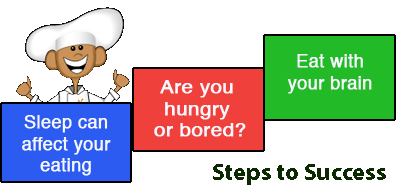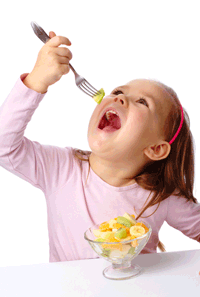Eat with Your Brain

Recently my teenage son accused me of eating with my brain. He thought that the accusation would sting but in fact, it made me smile. Yes, I do eat with my brain and he doesn’t know it, but he does too. What my son meant was that I think about the nutritional value of what I eat more than the taste of what I put in my mouth. When I eat, and when I feed my family, the first thing I ask myself is: “How is this food going to nourish our bodies?” I don’t focus on whether or not the food will taste good; I trust that fresh, whole, nourishing foods will taste great. Eating with your brain requires that you redefine some of the ways that you think about food; eating this way helps you eat moderately without overeating. These definitions have helped me:
-
Full is satisfied not stuffed. Stuffed is when I have eaten so much that I have to loosen my belt or unbutton my pants. If I expect to be stuffed, I will always overeat. Full is the feeling I get when I have eaten just enough; I am satisfied.
-
Hunger is not an emergency. Many people, especially children, treat hunger as an emergency. They think that if they
 don’t eat right away they will die. In reality, food is usually only a few minutes away. Having nutritious food minutes away requires planning. For example, diabetics usually have the right food available in case their blood sugar drops too low. You can keep healthy snacks nearby too so that you don’t face a food emergency.
don’t eat right away they will die. In reality, food is usually only a few minutes away. Having nutritious food minutes away requires planning. For example, diabetics usually have the right food available in case their blood sugar drops too low. You can keep healthy snacks nearby too so that you don’t face a food emergency.
-
Good food is nutritious food. Good food is food that that nourishes; not food that tastes good but is nutritionally empty. Make sure that kids hear that nutritious food is good, not that snack foods, fast foods, or sugar-laden foods are good.
-
There is no such thing as bad food. Labeling foods “bad” usually means that I try to avoid them while at the same time being strongly attracted to them. Tell me I can’t have a candy bar and I want it even more. There are no inherently “bad” foods; all foods are fine in moderation. Some foods are less nutritious than others, and I eat those in smaller quantities than nutritionally rewarding foods.
-
Some foods are more “calorie worthy" than others. When faced with certain foods, I ask myself, “Is this calorie worthy? If I can eat 1500 calories a day, do I want to spend a portion of them on this particular food? Is it fresh, nourishing and tasty?” If the answer is yes, then I eat it, if no, I think twice. I have mentioned the “calorie worthiness” of foods so often that I even hear my son making similar comments. He is starting to eat with his brain!
When you start to redefine some of the ways that you think and talk about food, hunger, and satiety, you and your kids will be eating with your brains too.
Healthy Eating

Healthy Child

Written by Lisa Hinz PhD
•
Written on Dec 19, 2012
•
Last updated on Jan 05, 2015

 don’t eat right away they will die. In reality, food is usually only a few minutes away. Having nutritious food minutes away requires planning. For example, diabetics usually have the right food available in case their blood sugar drops too low. You can keep healthy snacks nearby too so that you don’t face a food emergency.
don’t eat right away they will die. In reality, food is usually only a few minutes away. Having nutritious food minutes away requires planning. For example, diabetics usually have the right food available in case their blood sugar drops too low. You can keep healthy snacks nearby too so that you don’t face a food emergency.
0 Comments